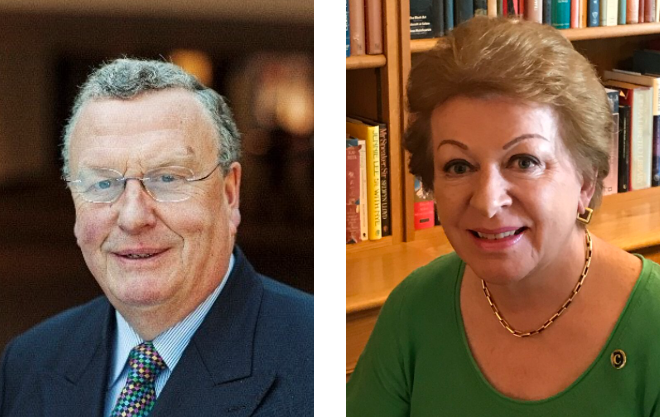Dr Shelagh Farrell FCGDent, a College Founder and Ambassador, talks to Professor Nairn Wilson FCGDent, President Emeritus of the College, about leaving a legacy to CGDent.
Nairn: Shelagh, may I begin by thanking you on behalf of the College for your tremendous support for the College as a Founder, one of its first Fellows, Ambassador and now one of its first legators. Such exceptional support is hugely appreciated and of immense importance to the College as it grows and develops. Also, thank you for agreeing to answer the following questions:
Why have you considered it important to support the College with both a Founder’s donation and a legacy?
Shelagh: The Faculty of General Dental Practice (FGDP(UK)), from the time of its foundation in 1992, always had the ambition of forming a College – Royal College of Dentistry. At the time, we promised the Royal College of Surgeons of England (RCS Eng) that the Faculty would remain part of the College for 10 years, filling a void left by the Faculty of Anaesthetists which had separated away to form what became the Royal College of Anaesthetists within a matter of a few years. Despite attempts to leave after 10 years, FGDP(UK) remained part of RCS Eng for 28 years.
The income of most, if not all, Royal Colleges comes from its members who pay subscriptions and fees to sit their examinations and benefit from postgraduate qualifications. Over the years, FGDP(UK) changed its qualifications to reflect the ways in which dentistry had moved on; for example, with the increasing use of implants. It is time to change again to create career pathways for all members of the dental team, which are challenging but achievable, thus enhancing standards in the provision of dental care.
When FGDP(UK) was established, it had one office on the ground floor of the RCS Eng. In a short space of time, it was obvious that more staff were needed to support and promote the Faculty’s activities and examination system. The Faculty was then allocated a redundant animal house on the top floor of the RCS Eng building. This became the Faculty offices for the remainder of its time at the RCS Eng.
The new College needs to acquire suitable premises in the process of becoming the Royal College of General Dentistry. This requires money and that is why, besides giving a Founder’s donation, I have left the College a legacy in my will.
N: What would you like to say to colleagues who have not yet joined and donated to the College?
S: Some colleagues say that they will join the College when it receives Royal status. This, however, creates a “catch 22” situation. Unless the College expands its now growing number of Full Members, Associate Fellows and Fellows, it is unlikely to receive Royal status. Hence, I would urge colleagues of all ages, specifically younger colleagues to join, support the College and, in the process, benefit from a worthwhile career pathway, with mentoring, which will add to their enjoyment of dentistry and enhance their professional fulfilment.
N: In what ways has dentistry in the UK been compromised by not having its own, independent Royal College?
S: The UK has three Royal Surgical Colleges based in London, Edinburgh and Glasgow, all with Faculties of Dental Surgery. Over the years there has been great competition between these Faculties to promote themselves and increase their influence and income both home and abroad. But more important is the opportunity they have to advise and influence (or not) governments, albeit that general dentistry, let alone members of the dental team are not well, if at all, represented in their memberships. Governments listen to Royal Colleges. When the College of General Dentistry becomes the Royal College of General Dentistry, dentistry will at long last have its own independent, UK-wide, collegiate influence, speaking for the whole of the profession. Dentistry, specifically general dental practice, which provides more than 90% of oral healthcare, certainly needs this, as it seems to me at the moment that this core provision of dental services is at the lowest ebb that I have seen over the last 50 years.
N: Shelagh, two more questions. Firstly, what do you see to be the immediate priorities of the College?
S: Recruitment is clearly the way to increase the membership and the influence of the College. Dentistry is the only major healthcare profession which has not got its own Royal College. The majority of dentists are in practice, even if they are specialists. All these dentists, together with the members of their dental teams, need to come together to strengthen their unified voice, to improve standards, and to enhance the care provided to the general public.
N: And finally, what would you like the College to achieve by 2030?
S: I would like to see the College granted Royal status, with the majority of the profession being part of the membership, reaping and continuously improving the benefits the College can provide, enhancing their enjoyment and fulfilment in the wonderful and great career that dentistry can bring. I also hope that the College, then Royal College, will have suitable premises where members, politicians, the media, members of the general public and others can contact and meet staff to enable the College to realise its potential as the much-needed collegiate home for general dentistry.
N: Shelagh, very many thanks for your insightful and thought-provoking answers to my questions. Hopefully, this interview will encourage others to follow your lead as an inspirational Fellow and legator.
With renewed thanks for your exceptional generosity to the College.
Any member wishing to make a legacy to the College is encouraged to contact Abhi Pal, President of the College, or Simon Thornton-Wood, Chief Executive of the College, at contact@cgdent.uk or Nairn Wilson, President Emeritus, at nairn.wilson@btinternet.com.
